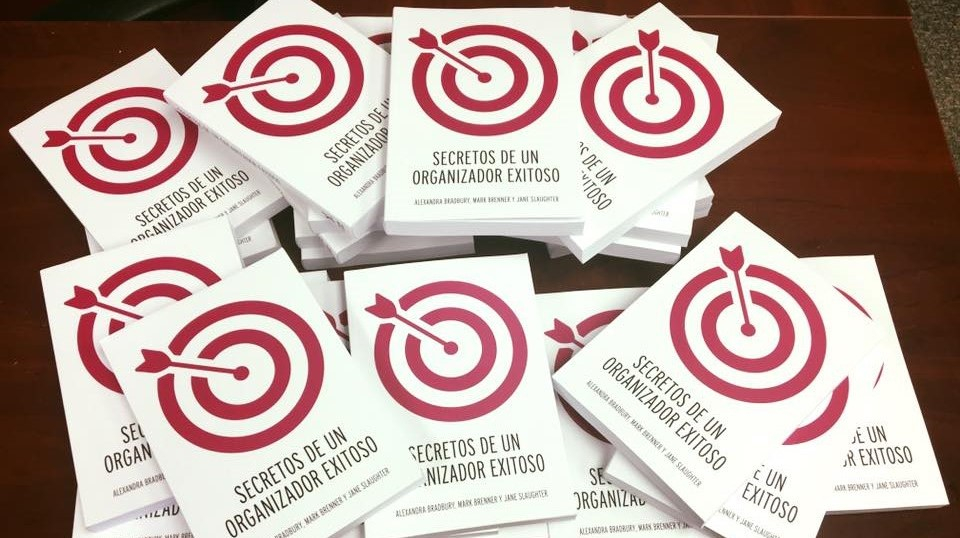¡Viva los Troublemakers!

Secretos de un organizador exitoso, the Spanish translation of Secrets of a Successful Organizer, now available for purchase at labornotes.org/secretos. Photo: Northwest Arkansas Worker Justice Center
How do you say “troublemaker” in Spanish?
That was one of the questions we at Labor Notes, “the Troublemakers Union,” faced in translating our 2016 book Secrets of a Successful Organizer, which is about organizing your co-workers on the job to enforce your rights and win new ones—that is, to make trouble for bosses. Now we’re eager to get Secretos de un organizador exitoso ($15, available here) into the hands of as many Spanish-speaking workers and organizers as possible, hopeful that it might be of use to Latino workers and allies organizing against the Trump administration’s attack on immigrants and workers in general.
The U.S. is now the second largest Spanish-speaking country in the world: 40 million U.S. residents over the age of five speak Spanish at home.
But this population comes from every Spanish-speaking country on earth, so it can be difficult to find the right word for everyone. We found that no two Spanish speakers had the same opinion.
Puerto Ricans, for example, might translate troublemaker as “buscabulla.” But Puerto Ricans are just one group of U.S. Latinos.
The majority are Mexican. One Labor Notes supporter says he used “problemático” with union activists at a Mexican garment factory, which was what the boss called them.
Others suggested we not even attempt to translate it, and just leave it as “troublemaker,” since Latinos in the U.S. are accustomed to Spanglish.
Ultimately, we settled on “agitador”—agitator. It might not be everyone’s top choice—troublemakers are notoriously opinionated. But we’re happy to be having these types of debates. No matter how you translate it, we’re in need of a lot more troublemakers on the job.
USE THIS BOOK
While there are two million union members of Hispanic descent in the U.S., Latino workers have the lowest union membership rate of any group, at 8.8 percent, compared to 10.7 percent for the workforce as a whole.

SUPPORT LABOR NOTES
BECOME A MONTHLY DONOR
Give $10 a month or more and get our "Fight the Boss, Build the Union" T-shirt.
In part that’s due to Latinos, especially immigrants, being concentrated in industries with notoriously low unionization rates, like agriculture and residential construction. Employers also use immigrants to staff the nonunion sectors of warehousing, trucking, and meatpacking.
But as you’ve read in the pages of Labor Notes, it’s common to see Latino workers on the front lines of organizing their workplaces, through worker centers or unions—like farm workers in Washington state, warehouse workers in Chicago, poultry workers in Arkansas, and hotel workers in Tennessee.
We wanted to help that organizing with a resource in these workers’ own language. Organizing is hard enough without having to do it in another tongue.
MORE LANGUAGES COMING
We’re happy to have the book in Spanish, but it’s only a start. Groups are working on translating the 47 secrets into Japanese, Chinese, German, and even Norwegian. Our Japanese friends are planning two weekends of Secrets schools in Tokyo and Osaka this fall.
It seems the U.S. isn’t the only country where unions have gotten away from organizing on the job, which is what Secrets and Secretos are all about.
“We don’t have any resources like that, that focus on building power from below,” says Thomas Goes of OKG (Organizing, Fighting, Winning), which is translating Secrets into German. “Labor Notes stands for democracy, building workers’ power, and social movement unionism, and we want to bring in and strengthen these ideas.”
We hope some of these international troublemakers will be at the 2018 Labor Notes Conference, April 6-8 in Chicago. Start making your plans to meet them there. Check in next week at labornotes.org/2018 to register.
Our Spanish translation was made possible thanks to donations from Labor Notes supporters. We rely on you not just for financial support but to be our eyes and ears. Know a group of troublemakers, “alborotadores,” “agitadores,” or “buscapleitos” who could benefit from Secretos? Put us in touch. And order the book at labornotes.org/secretos for $15 (with big discounts for bulk orders). There you’ll also find the free handouts in English and Spanish that go with the book and with our “Secrets” workshops.

